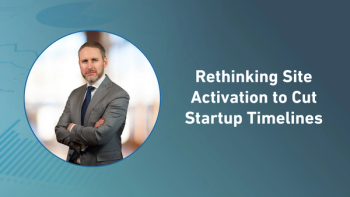
- Applied Clinical Trials-11-01-2020
- Volume 29
- Issue 11
COVID-19 Puts Spotlight on Study Start-up
Sujay Jadhav, global vice president, study start-up, Oracle Health Sciences, spoke with ACT on how study start-up has been impacted by the pandemic and what its future holds beyond COVID.
At the outset of clinical trials—prior to enrolling the first patient—a considerable amount of work is done in planning and setting up a study for success. Collectively referred to as study start-up, these decisions can have a great impact on timelines and budgets. While the COVID-19 pandemic has slowed down the implementation of new trials, study start-up has the advanced technology necessary to overcome sucha large hurdle.
In this interview, Sujay Jadhav, global vice president, study start-up, Oracle Health Sciences, touches on how COVID has affected study start-up and what new perspectives it has forced the industry to have on its own challenges.
Andy Studna: How did the pandemic affect study start-up in the beginning vs. study start-up about six months later?
Sujay Jadhav: In March, not long after the pandemic was spreading globally, Oracle created a study start-up response team, which developed and released several COVID-19 specific application enhancements to help our customers:
- Activate workflows were modified to allow certain tasks to take place simultaneously. This was a critical enabler for COVID-19-specific therapeutics and vaccine studies where operational time savings were critical.
- We released a new organization-specific Analyze report to allow clinical trial teams to assess the impact of COVID-19-related delays at the study, country, and investigator level. This allowed pharmaceutical companies and CROs to better plan the revised schedules for studies and assess the resource and financial impact of the pandemic.
- Oracle support teams immediately prioritized all support requests related to COVID-19 clinical trials to ensure expedited response.
In the present, six months after the outbreak of the pandemic in the U.S., we are seeing a resurgence in studies, which are either new, or previously placed on hold.
AS: Do you think the pandemic has shined new light on challenges that may have existed in study start-up beforehand?
Jadhav: Yes. Study start-up is a continual focus because it has such an impact on clinical trials. Problems with start-up, more than any other phase of a clinical trial, have the greatest potential to increase timelines and budgets. Fortunately, technology for study start-up has advanced to the point that current solutions can do what Excel never will—automatically trigger workflows as a clinical trial unfolds.
It has also become possible to set and track milestones, improve communications among partners, act as a central repository for study documents, and integrate the flow of information from various data sources in a compliant manner—functions that are critical to successful site-activation processes as more clinical trials become global and complex.
Furthermore, companies with purpose-built solutions may have an advantage to monitor impact closely and accelerate the responses needed, where possible.
AS: How can predictive analytics and effective study planning help CROs and sponsors run effective and accurate studies during these challenging times?
Jadhav: Machine learning is a quantum leap in the field of predictive analytics, helping ensure accurate and successful forecasting, more accurately and significantly earlier than humans do. It is these predictions that can help to drive planning and informed decisions.
It is this proactive planning that can mitigate mistakes that can impact overall product development costs.
For example, in the case of under-enrollment in studies, an entrenched industry problem, machine learning using leading indicators contained in the clinical development plan (e.g., indication, phase(s), key inclusion/exclusion criteria, etc.) can be used to help ensure that the required sites can be found, so enrollment success can be predicted, prior to the protocol being written and approved.
In addition to the machine learning capabilities embedded in Oracle’s Activate solution, the study planning tool allows sponsors and CROs to fully plan all of its study start-up milestones from protocol approval to activation.
Leveraging multi-plan comparison and visualization tools, users can scenario-plan to determine the best countries and sites to activate, based on the characteristics of the study, to hit enrollment goals in the fastest possible time.
AS: What special programs or efforts around COVID-19 has Oracle made available for sponsors/CROs?
Jadhav: Many pharmas and CROs have pivoted quickly to develop and test potential COVID-19 treatments and vaccines—we at Oracle are working very closely with customers to support those efforts. As of today, the Oracle Cloud is running 93-plus clinical trials to test the safety and effectiveness of COVID-19 drugs and vaccines, across 53 different customers. These trials span many countries and hundreds of investigator sites.
Additionally, Oracle is supporting the National Institutes of Health’s Coronavirus Prevention Network (CoVPN)—formed to respond to the global pandemic with a goal of registering one million volunteers for large-scale testing of vaccines. As part of this initiative, Oracle developed and provided a Cloud System called the CoVPN Volunteer Screening Registry to identify and screen volunteers who want to participate in COVID-19 vaccine clinical trials.
AS: How are new approaches (such as decentralized trials) changing the landscape of study start-up all together?
Jadhav: Currently, studies which have pivoted to utilizing remote devices and/or virtual visits because of the pandemic, are following a traditional study start-up process. These studies have had their protocol amendments approved by the IRB/EC due to the immediate need to have these studies continue.
The industry expectation is that the use of decentralized clinical trials will continue at scale post-pandemic. This will require assessment and direction from regulatory agencies.
The adoption of decentralized clinical trials will have significant impact on study start-up, as the sequence of processes can change. For example:
- Subjects can be found and enroll in trials before or separate from sites and primary investigators.
- Devices and virtual tools must be validated prior to being deployed. It is still not clear if this is under the responsibility of the site/principal investigator (source data), or the sponsor/CRO (case data).
These impacts will first be realized when there is an option to run a trial using traditional visits and any regulatory risk has to be assessed.
In addition, digital transformation will also put extra emphasis on the site selection process. As a result, assessing site ability to leverage telehealth will be a factor in site selection.
AS: Beyond what you already discussed, what else do you think the future holds for study start-up?
Jadhav: In the near future, study startup will be significantly impacted by:
- Regulatory changes: The forthcoming ICH E6 (R3) “Good Clinical Practice (GCP)” (draft scheduled for end of this year) will introduce quality by design (QbD) and associated metrics (e.g., QTLs). Quality, which must be ensured upfront in operational systems such as study start-up, instead of after the fact, in systems such as eTMF (electronic trial master file) and QMS (quality management system).
- Decentralized clinical trials: As discussed, the pandemic has forced the use of decentralized clinical trials and this use is likely to continue post-pandemic.There may also be more emphasis on a site’s ability to leverage telehealth, as a key factor in the site selection process. We may also see an acceleration in the use of patient hot-spotting technology, which allows the ability to mine electronic health record (EHR) and electronic medical record (EMR) data in a de-identified way to identify a higher quality of patients.
Andy Studna is an Assistant Editor for Applied Clinical Trials. He can be reached at
Articles in this issue
about 5 years ago
FDA Reassurances Always Go a Long Wayabout 5 years ago
Applied Clinical Trials, November 2020 Issue (PDF)about 5 years ago
News Notes (November)about 5 years ago
Employing the Power of Bayesian Methods to Expedite Learningover 5 years ago
Gold Standards Remaining Gold Standards for Germany's HTANewsletter
Stay current in clinical research with Applied Clinical Trials, providing expert insights, regulatory updates, and practical strategies for successful clinical trial design and execution.




